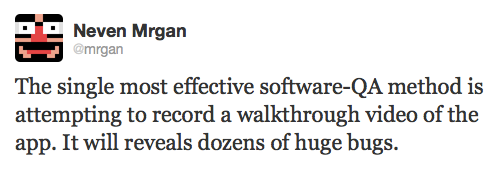Our team functions in different capacities for each business engagement, but we typically have a project or few where we’re exclusively building a large site for a client. In those scenarios we tend to use a loosely defined two-week development cycle anchored by a demo presentation at the end. Seeing this tweet reminded me of why the demos are so important:

In the early-mid phases of a project, code and features can change significantly over the course of a couple weeks. Later in the project, or after launch, features deserve more scrutiny to ensure they provide value and don’t conflict with the direction of the product or site. Regular team reviews via demo meetings help all parties come together and identify bigger picture decisions that don’t surface in project management tools or ticket queues.
What a developer thinks is code-complete, what the user experiences, and what the stakeholders expect are almost always three different views on reality. As a developer preparing to demonstrate some features, your perspective is different than when you’re just trying to close a ticket.
Regardless of specific development process, good communication is always required to succeed. Compromise is easy to reach when problems or challenges are identified early. The bi-weekly demo gets everyone talking and thinking about the same set of problems at the same time. Meanwhile, it allows for developers to have several days of sacred, focused development time; time well-spent gaining a better understanding of the problem domain and its tradeoffs.


